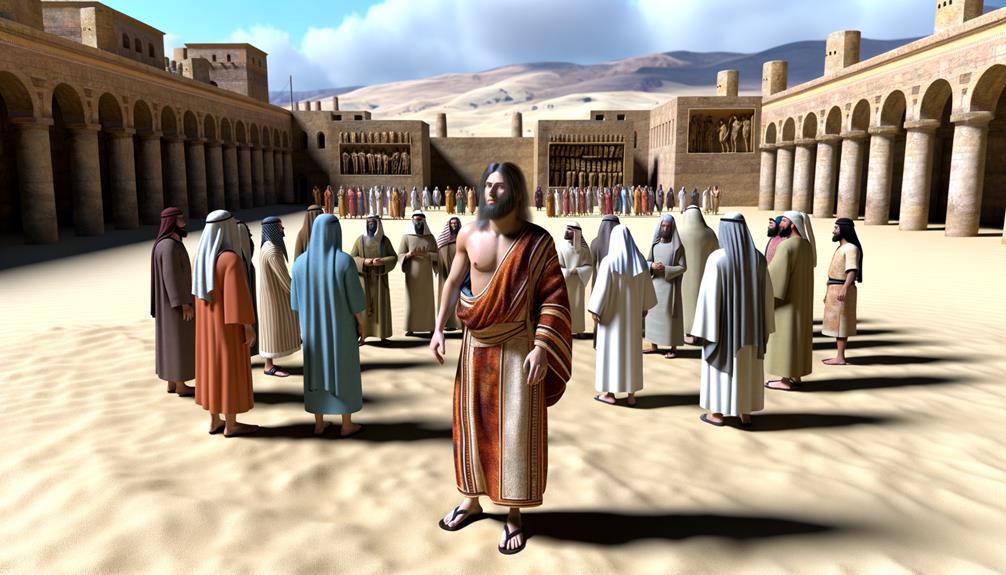Meaning Of Yeshua In The Bible: Salvation and Identity
The name Yeshua, derived from the Hebrew root meaning ‘salvation‘ or ‘deliverance,’ holds deep theological and cultural importance in the Bible. It is the shortened form of Yehoshua (Joshua), evolving through linguistic influences from Aramaic and Hebrew.
In the Old Scriptures, figures such as Joshua and the post-exilic high priest embody this theme of divine salvation. In the New Scriptures, Yeshua is central as Jesus Christ, fulfilling messianic prophecies and symbolizing divine intervention (Matthew 1:21).
This continuity of salvation underscores its significance across both scriptures, inviting further exploration of its profound impacts.

Meaning of Yeshua in the Bible: Name of Jesus and Its Hebrew Roots
| Aspect | Details |
|---|---|
| Name | Yeshua (יֵשׁוּעַ) |
| Language of Origin | Hebrew |
| Meaning | Salvation, “The Lord is Salvation” |
| Biblical Reference | Ezra 2:2, Nehemiah 7:7; used as the original name of Jesus |
| Greek Translation | Iēsous (Jesus in English) |
| Symbolism | Redemption, deliverance, divine savior |
| Spiritual Insight | Represents God’s plan to save humanity through Christ |
Etymology of Yeshua

The etymology of the name Yeshua, derived from the Hebrew root ‘y-ש-ע,’ reflects a profound significance, denoting salvation or deliverance. This root, appearing extensively in Semitic languages, underscores the essential nature of divine intervention in human affairs.
The name Yeshua itself is a shortened form of Yehoshua (Joshua), historically contextualizing it within the Hebrew tradition of names bearing theological meanings.
As elucidated by scholars, the transformation from Yehoshua to Yeshua illustrates a linguistic evolution influenced by Aramaic and colloquial Hebrew. This etymological development not only signifies a linguistic shift but also emphasizes the cultural and religious importance of the concept of salvation in Judaic thought.
Such naming conventions reveal the intricate link between language, theology, and identity.
Yeshua in the Old Testament
In the Old Scripture, the name Yeshua emerges in various contexts, often associated with figures who embody the themes of divine salvation and deliverance.
For example, Yeshua, a variant of Joshua, is a central figure in the conquest of Canaan, symbolizing God’s deliverance of Israel (Joshua 1:1-9).
Similarly, Ezra references Yeshua, the high priest, who played a pivotal role in the post-exilic restoration of Jerusalem (Ezra 3:2). This recurrent use underscores Yeshua’s thematic resonance with divine intervention and leadership.
Additionally, the name Yeshua, meaning ‘salvation,’ serves as a linguistic and theological precursor, enriching the understanding of its significance in the broader biblical narrative (Nehemiah 8:17).
Consequently, Yeshua’s Old Testament presence is both multifaceted and profound.
Yeshua in the New Testament

In the New Covenant, the name Yeshua, rooted in its Hebrew origins, is central to understanding the narrative of Jesus Christ as the fulfillment of Messianic prophecies.
This is evidenced through His various titles and roles, such as ‘Messiah’ and ‘Son of God,’ which align with the expectations set forth in the Hebrew Scriptures (Matthew 1:21, John 1:41).
Additionally, the Gospels meticulously document the numerous prophecies that Yeshua is said to fulfill, reinforcing His significance within the Christian theological framework (Luke 24:44).
Yeshua’s Hebrew Origins
Frequently overlooked in modern discussions, Yeshua’s Hebrew origins are deeply rooted in the linguistic and cultural context of the New Covenant.
The name ‘Yeshua’ itself is a derivative of ‘Yehoshua,’ meaning ‘Yahweh is salvation‘ (Strong’s Concordance H3442). This etymology underscores the theological significance embedded within the name, reflecting the salvific role Yeshua occupies in Christian doctrine.
In Hebrew culture, names were not merely identifiers but encapsulated essential characteristics and destinies. Hence, understanding Yeshua’s Hebrew origins provides critical insight into His mission and identity as perceived by early Christians.
When the New Scriptures writers employed ‘Yeshua,’ they invoked a rich tapestry of Jewish tradition and messianic expectation (Matthew 1:21), thereby bridging Old Scriptures prophecies with New Scriptures fulfillment.
Titles and Roles
Building upon the understanding of Yeshua’s Hebrew origins, the New Scripture attributes numerous titles and roles to Yeshua, each reflecting a multifaceted identity and fulfilling specific prophetic and theological functions.
Key titles include ‘Messiah‘ (Christos in Greek), indicating His role as the anointed one (Matthew 16:16), ‘Son of God,’ underscoring His divine filiation (Mark 1:1), and ‘Son of Man,’ emphasizing His humanity and messianic mission (Daniel 7:13, Matthew 9:6).
Additionally, Yeshua is referred to as ‘Rabbi,’ reflecting His role as a teacher (John 1:38), and ‘Lamb of God,’ symbolizing His sacrificial role (John 1:29).
These titles collectively encapsulate Yeshua’s unique identity and mission within Christian theology.
Messianic Prophecies Fulfilled
Numerous passages within the New Covenant assert that Yeshua’s life, death, and resurrection fulfill key messianic prophecies detailed in the Hebrew Scriptures, thereby affirming His role as the promised Messiah. Scholars often reference specific events to substantiate these claims:
- Virgin Birth: Isaiah 7:14 prophesied a virgin birth, which the New Agreement attributes to Yeshua’s birth (Matthew 1:22-23).
- Suffering Servant: Isaiah 53 describes a suffering servant, which Christians interpret as Yeshua’s crucifixion (1 Peter 2:24).
- Resurrection: Psalm 16:10 speaks of not letting the Holy One see decay, aligning with Yeshua’s resurrection (Acts 2:31).
- Kingly Lineage: Jeremiah 23:5-6 foretells a righteous branch from David, fulfilled in Yeshua’s genealogy (Matthew 1:1).
This alignment underscores Yeshua’s messianic credentials, rooted in scriptural prophecy.
Salvation and Deliverance

The concept of salvation and deliverance, central to the name Yeshua, is deeply rooted in Old Scriptures references such as Isaiah 53, which prophesies a suffering servant who will bring redemption.
This theme reaches its fulfillment in the New Scriptures through the life, death, and resurrection of Jesus, as detailed in passages like John 3:16.
Today, the spiritual significance of Yeshua as the embodiment of salvation continues to resonate, impacting theological perspectives and individual faith practices.
Old Testament References
While the name Yeshua is primarily recognized in the New Covenant, its roots and significance are deeply embedded in Old Scriptures narratives that emphasize themes of salvation and deliverance.
These narratives highlight God’s intervention and protection for His people, often prefiguring the redemptive work associated with Yeshua. Key instances include:
- Exodus 14:13-14: Moses assures the Israelites of God’s deliverance at the Red Sea.
- Joshua 1:9: Joshua, whose name is a variant of Yeshua, leads Israel into the Promised Land.
- Isaiah 43:11: God declares Himself as the only Savior.
- Psalm 62:2: David proclaims God as his rock and salvation.
These passages collectively underscore the continuity of God’s saving actions throughout biblical history.
New Testament Fulfillment
Building upon the Old Covenant themes of salvation and deliverance, the New Covenant presents Yeshua as the definitive fulfillment of God’s redemptive promise. The New Scripture authors consistently link Yeshua’s life, death, and resurrection to divine salvation, emphasizing His role as the Messiah. This fulfillment is evident in multiple dimensions as shown below:
| Aspect | Old Scripture Prophecy | New Scripture Fulfillment |
|---|---|---|
| Birth | Isaiah 7:14 | Matthew 1:22-23 |
| Ministry | Isaiah 61:1-2 | Luke 4:18-21 |
| Sacrifice | Isaiah 53:5 | John 19:34 |
| Resurrection | Psalm 16:10 | Acts 2:31 |
Each aspect underscores how Yeshua’s mission aligns with prophetic expectations, thereby realizing the scriptural vision of salvation and deliverance.
Spiritual Significance Today
In contemporary theological discourse, Yeshua’s role in salvation and deliverance continues to be a central theme, reflecting both historical interpretations and modern spiritual understandings. This significance is multifaceted, encapsulating key aspects of Christian faith:
- Redemption: Yeshua’s sacrifice is viewed as the ultimate act of redemption, providing believers with a path to reconciliation with God.
- Transformation: His teachings inspire personal and communal transformation, leading to spiritual renewal.
- Liberation: Yeshua is seen as a liberator from sin and spiritual bondage, offering freedom and hope.
- Eschatological Promise: Belief in Yeshua includes the promise of eternal life and the coming of God’s kingdom.
These elements underscore Yeshua’s enduring spiritual significance in contemporary Christian practice.
Historical Context

The historical context of the name Yeshua can be traced back to its Hebrew origins, where it was a common given name during the Second Temple period in Jewish history.
Derived from the Hebrew root ‘yasha,’ meaning ‘to save’ or ‘to deliver,’ Yeshua was a variant of the name Yehoshua (Joshua).
This era, spanning from 516 BCE to 70 CE, was marked by significant religious, social, and political transformations within the Jewish community.
The name’s prevalence reflects a cultural emphasis on divine salvation and deliverance, resonating deeply with the Jewish people’s historical experiences of exile and return.
Consequently, understanding Yeshua’s historical context provides essential insights into its enduring significance within both Jewish and early Christian traditions.
Theological Implications

Given its etymology and historical usage, the name Yeshua carries profound theological implications, particularly within the context of messianic expectations and the concept of salvation in both Jewish and Christian traditions. The name Yeshua, derived from the Hebrew verb ‘yasha’ (to save), encapsulates key theological principles:
- Messianic Fulfillment: Yeshua embodies the fulfillment of Old scriptures prophecies concerning the Messiah.
- Divine Salvation: It signifies divine intervention and deliverance, central to both Judaism and Christianity.
- Incarnation: In Christian theology, Yeshua highlights the belief in God becoming human.
- Redemption: It underscores the salvific mission of Jesus, central to Christian soteriology.
These elements demonstrate how Yeshua’s name is intrinsically linked to foundational theological concepts.
Symbolism and Meaning

Symbolically, the name Yeshua conveys a rich tapestry of cultural and spiritual narratives that resonate through its linguistic roots and scriptural contexts. The Hebrew name Yeshua, meaning ‘salvation,’ encapsulates the essence of deliverance, redemption, and divine intervention within the biblical framework.
This name’s significance extends beyond mere nomenclature, embedding itself deeply in the theological and historical consciousness of the Judeo-Christian tradition.
| Symbolism | Cultural Context | Scriptural Reference |
|---|---|---|
| Salvation | Hebrew tradition | Isaiah 12:2 |
| Deliverance | Jewish messianic hope | Exodus 14:13 |
| Redemption | Christian theology | Luke 2:11 |
| Divine Aid | Ancient Israelite belief | Psalm 118:25 |
| Prophecy Fulfilled | New Testament | Matthew 1:21 |
Understanding Yeshua’s symbolism reveals layers of religious and historical narratives essential to biblical interpretation.
Yeshua’s Legacy

Building upon the rich symbolism of Yeshua, his legacy manifests through profound theological developments and enduring cultural impacts within both Jewish and Christian traditions. Yeshua’s influence is multifaceted:
- Messianic Fulfillment: Christians view Yeshua as the promised Messiah, fulfilling Old Scriptures prophecies (Isaiah 53).
- Ethical Teachings: His teachings on love, forgiveness, and humility have shaped moral frameworks (Matthew 5-7).
- Cultural Artifacts: Yeshua’s life and teachings have inspired countless works of art, literature, and music.
- Interfaith Dialogue: Yeshua serves as a bridge in Jewish-Christian dialogue, fostering understanding and reconciliation.
In these ways, Yeshua’s legacy continues to resonate, influencing both religious thought and broader cultural expressions.
Conclusion
The name Yeshua, derived from the Hebrew root meaning ‘to save‘ or ‘deliver,’ appears prominently in both the Old and New Scriptures, symbolizing salvation and divine intervention.
Historically contextualized, its theological implications extend to the core of Christian doctrine.
Curiously, the name Yeshua was common, with archaeological findings indicating its use by approximately 71 individuals in ancient inscriptions.
This prevalence underscores its cultural and religious significance, enriching the understanding of its biblical and historical legacy.






